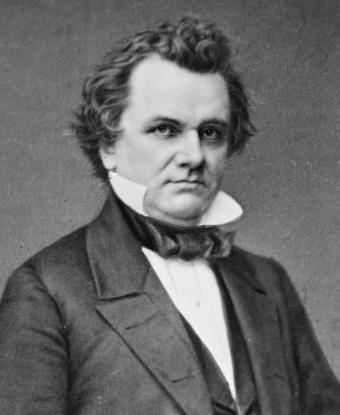Last updated: July 31, 2020
Person
Stephen A. Douglas

Stephen Arnold Douglas, best known for his career in national politics and his antebellum political rivalry with Abraham Lincoln, began life inauspiciously enough in rural Vermont. The son of a country doctor, Douglas was educated in common schools and later completed his preparatory education at the Canandaigua Academy in Canandaigua, N.Y.
Moving west to Illinois, Douglas completed his studies to become an attorney and soon began his meteoric rise in state politics when he was elected State's Attorney for the Morgan circuit in 1835. From there, Douglas quickly rose through the Illinois state political and legal systems and by 1843 had secured a seat in Congress, elected to the House of Representatives as a Democrat.
During his time as a congressman and later as a senator, Douglas was best known for his work promoting the controversial Kansas-Nebraska Act of 1854. The Kansas-Nebraska Act created the territories of Kansas and Nebraska and sought to settle the issue of whether these territories would be admitted as free or slave states into the Union through popular sovereignty, meaning residents would vote on the issue. This politicization resulted in pro-slavery settlers and abolitionists flooding the territories, resulting in Bleeding Kansas. The Kansas-Nebraska Act spurred Abraham Lincoln to oppose Douglas and challenge his seat in the Senate.
When Lincoln ran for the US Senate seat held by Douglas in 1858, the two men faced off in a series of seven impassioned debates, famously known as the Lincoln-Douglas Debates. While Lincoln may have been considered the victor of the debates in the view of history, Douglas won the election. Two years later, he ran against Lincoln as the Northern Democratic candidate in the four-way race for president. Though finishing second to Lincoln in popular votes, he mustered only 12 electoral votes, the fewest by far of the four candidates.
After the inauguration, Douglas threw his support behind Lincoln and undertook a tour to bolster support for the Union, making visits to Virginia, Ohio and Illinois. However, less than three months after Lincoln's inauguration, Douglas contracted typhoid fever and died in Chicago on June 3, 1861.
